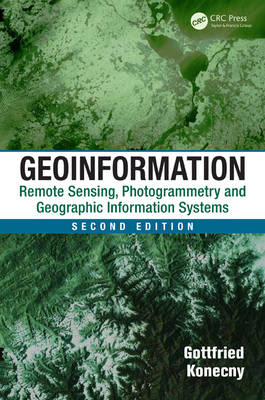
Geoinformation
Remote Sensing, Photogrammetry and Geographic Information Systems, Second Edition
Seiten
2014
|
2nd edition
Crc Press Inc (Verlag)
978-1-4200-6856-6 (ISBN)
Crc Press Inc (Verlag)
978-1-4200-6856-6 (ISBN)
- Titel z.Zt. nicht lieferbar
- Versandkostenfrei
- Auch auf Rechnung
- Artikel merken
Offers coverage of remote sensing, digital photogrammetry, and GIS. This work features information on web-based image viewing with Google Earth; aerial platforms; and, existing digital photogrammetric software systems, including Intergraph image station, Autodesk, Oracle Spatial, and more. It covers land management and cadastre.
Written by a renowned expert, Geoinformation: Remote Sensing, Photogrammetry and Geographic Information Systems, Second Edition gives you an overarching view of how remote sensing, photogrammetry, and geographic information systems work together in an interdisciplinary manner. The book presents the required basic background of the geoinformatics concept in which the different methodologies must be combined. It details the principal components of remote sensing, from theoretical principles to advanced image analysis and interpretation techniques, sensor components, and operating platforms.
New and Updated in the Second Edition:
Web-based image viewing with Google Earth
Aerial platforms
Existing digital photogrammetric software systems, including Intergraph image station, Autodesk, and Oracle Spatial
Land management and cadaster
Imaging sensors such as laser scanning, image spectrometry, radar imaging, and radar interferometry
With the advent of high-resolution satellite systems in stereo, the theory of analytical photogrammetry restituting 2D image information into 3D is of increasing importance, merging the remote sensing approach with that of photogrammetry. This text describes the fundamentals of these approaches in detail, with an emphasis on global, regional, and local applications. It provides a short introduction to the GPS satellite positioning system in the context of data integration.
An extensive overview of the basic elements of GIS technologies and data management approaches, as well as the widely employed positioning systems such as GPS and GSM networks, complete the presentation of the technological framework for geoinformation. Appropriate for GIS courses at all levels, the book proceeds beyond the science and technology to tackle cost considerations and practical implementation issues, giving you a starting point for multidisciplinary new activities and services in the future.
Written by a renowned expert, Geoinformation: Remote Sensing, Photogrammetry and Geographic Information Systems, Second Edition gives you an overarching view of how remote sensing, photogrammetry, and geographic information systems work together in an interdisciplinary manner. The book presents the required basic background of the geoinformatics concept in which the different methodologies must be combined. It details the principal components of remote sensing, from theoretical principles to advanced image analysis and interpretation techniques, sensor components, and operating platforms.
New and Updated in the Second Edition:
Web-based image viewing with Google Earth
Aerial platforms
Existing digital photogrammetric software systems, including Intergraph image station, Autodesk, and Oracle Spatial
Land management and cadaster
Imaging sensors such as laser scanning, image spectrometry, radar imaging, and radar interferometry
With the advent of high-resolution satellite systems in stereo, the theory of analytical photogrammetry restituting 2D image information into 3D is of increasing importance, merging the remote sensing approach with that of photogrammetry. This text describes the fundamentals of these approaches in detail, with an emphasis on global, regional, and local applications. It provides a short introduction to the GPS satellite positioning system in the context of data integration.
An extensive overview of the basic elements of GIS technologies and data management approaches, as well as the widely employed positioning systems such as GPS and GSM networks, complete the presentation of the technological framework for geoinformation. Appropriate for GIS courses at all levels, the book proceeds beyond the science and technology to tackle cost considerations and practical implementation issues, giving you a starting point for multidisciplinary new activities and services in the future.
University of Hannover, Germany
Introduction. Remote Sensing. Photogrammetry. Geographic Information Systems. Positioning Systems. Cost Considerations. Technological Changes.
| Erscheint lt. Verlag | 23.4.2014 |
|---|---|
| Zusatzinfo | 17 Tables, black and white; 438 Illustrations, color |
| Verlagsort | Bosa Roca |
| Sprache | englisch |
| Maße | 156 x 234 mm |
| Gewicht | 920 g |
| Themenwelt | Naturwissenschaften ► Geowissenschaften ► Geografie / Kartografie |
| Naturwissenschaften ► Geowissenschaften ► Geologie | |
| Technik ► Umwelttechnik / Biotechnologie | |
| Weitere Fachgebiete ► Land- / Forstwirtschaft / Fischerei | |
| ISBN-10 | 1-4200-6856-3 / 1420068563 |
| ISBN-13 | 978-1-4200-6856-6 / 9781420068566 |
| Zustand | Neuware |
| Haben Sie eine Frage zum Produkt? |
Mehr entdecken
aus dem Bereich
aus dem Bereich
über eine faszinierende Welt zwischen Wasser und Land und warum sie …
Buch | Hardcover (2023)
dtv (Verlag)
CHF 33,55
Buch | Hardcover (2024)
Schweizerbart'sche, E. (Verlag)
CHF 33,55
Eine Einführung in die spezielle Mineralogie, Petrologie und …
Buch | Hardcover (2022)
Springer Spektrum (Verlag)
CHF 83,95


